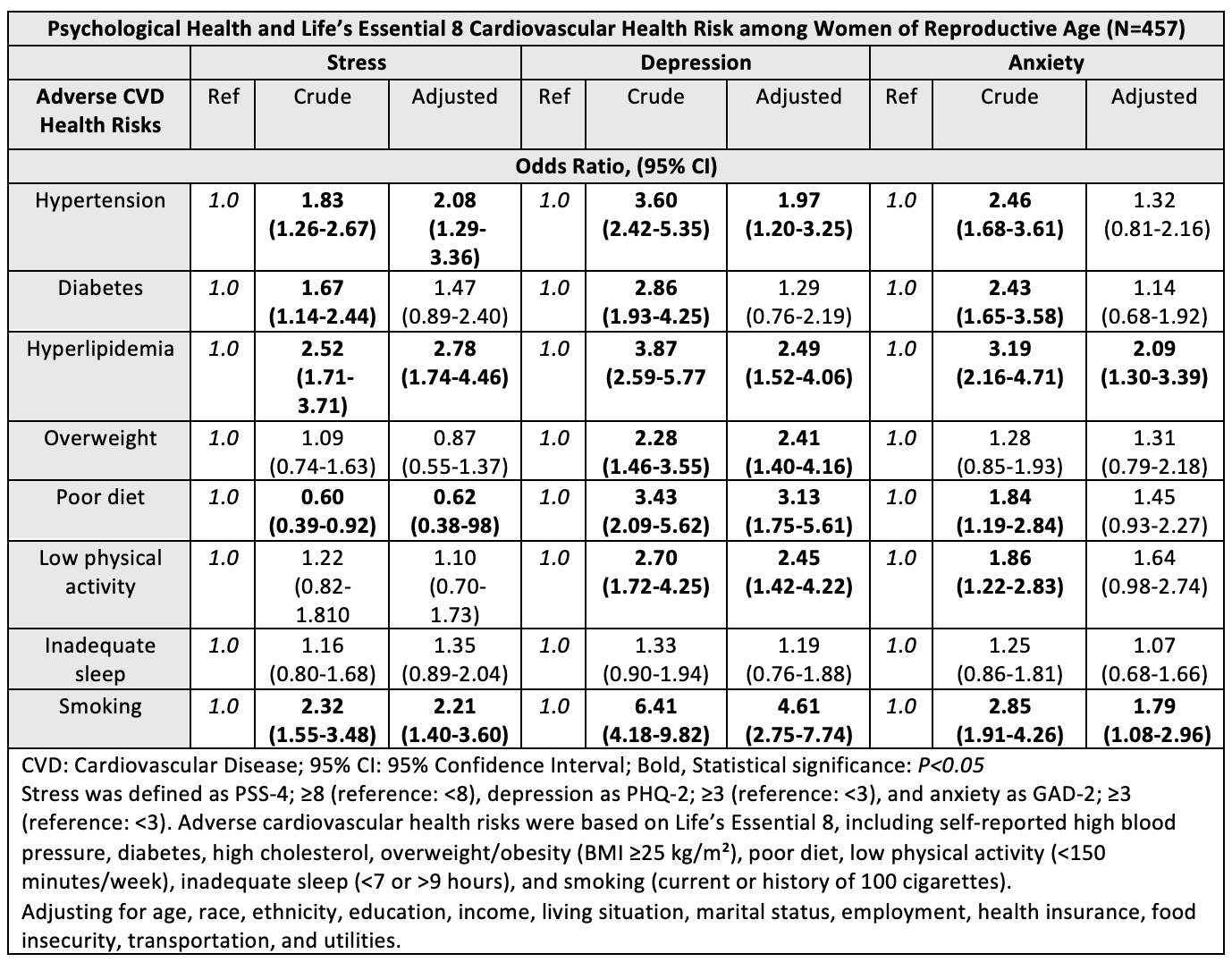Final ID: P3141
Psychological Health and Life’s Essential 8 Cardiovascular Health Risk among Women of Reproductive Age
Abstract Body: Introduction
Few studies have explored how stress, anxiety, and depression impact cardiovascular health among women of reproductive age. This study examines the relationship between psychological health and cardiovascular risk factors among community-enrolled participants and those from the American Heart Association’s Research Goes Red (RGR) registry.
Methods
We conducted a cross-sectional analysis of participants from the RGR Registry and the SAFE HEART study who completed cardiovascular and psychological health questionnaires. Psychological health risk was assessed using the Perceived Stress Scale (high stress, ≥8), Generalized Anxiety Disorder scale (high anxiety, ≥3), and Patient Health Questionnaire (high depression, ≥3). Dependent variables included Life’s Essential 8 cardiovascular health metrics: self-reported hypertension, diabetes, hyperlipidemia, overweight/obesity (≥25 kg/m2), poor diet (less than 5 servings of fruits/vegetables), low physical activity (<150 minutes/week, moderate), inadequate sleep (<7 or >9 hours), and smoking (current or history of 100 cigarettes). Logistic regression models were used to assess associations between psychological health and cardiovascular outcomes, adjusting for social risk covariates.
Results
In this cross-sectional study of 457 women aged 18-44 the mean age was 30 years ± 5.7, with 45.51% Black adults, 87.30% had at least college education, 66.52% were married or living with a partner and 71.12% were employed. After adjusting for covariates, high stress was associated with increased odds of hypertension (adjusted odds ratio [aOR] = 2.08, 95% CI: 1.29-3.36), hyperlipidemia (aOR = 2.78, 95% CI: 1.74-4.46), smoking (aOR = 2.21, 95% CI: 1.40-3.60) and lower odds of poor diet (aOR = 0.62, 95% CI: 0.38-0.98). High depression was similarly associated with hypertension (aOR = 1.97, 95% CI: 1.20-3.25), hyperlipidemia (aOR = 2.49, 95% CI: 1.52-4.06), smoking (aOR = 4.61, 95% CI: 2.75-7.74), overweight/obesity (aOR = 2.41, 95% CI: 1.40-4.16), low physical activity (aOR = 2.45, 95% CI: 1.42-4.22), and poor diet (aOR = 3.13, 95% CI: 1.75-5.61). High anxiety was also associated with hyperlipidemia (aOR = 2.09, 95% CI: 1.30-3.39) and smoking (aOR = 1.79, 95% CI: 1.08-2.96).
Conclusion
We found significant associations between psychological health and cardiovascular risk factors among women of reproductive age. Interventions to improve psychological health may improve cardiovascular health and prevent adverse pregnancy outcomes.
Few studies have explored how stress, anxiety, and depression impact cardiovascular health among women of reproductive age. This study examines the relationship between psychological health and cardiovascular risk factors among community-enrolled participants and those from the American Heart Association’s Research Goes Red (RGR) registry.
Methods
We conducted a cross-sectional analysis of participants from the RGR Registry and the SAFE HEART study who completed cardiovascular and psychological health questionnaires. Psychological health risk was assessed using the Perceived Stress Scale (high stress, ≥8), Generalized Anxiety Disorder scale (high anxiety, ≥3), and Patient Health Questionnaire (high depression, ≥3). Dependent variables included Life’s Essential 8 cardiovascular health metrics: self-reported hypertension, diabetes, hyperlipidemia, overweight/obesity (≥25 kg/m2), poor diet (less than 5 servings of fruits/vegetables), low physical activity (<150 minutes/week, moderate), inadequate sleep (<7 or >9 hours), and smoking (current or history of 100 cigarettes). Logistic regression models were used to assess associations between psychological health and cardiovascular outcomes, adjusting for social risk covariates.
Results
In this cross-sectional study of 457 women aged 18-44 the mean age was 30 years ± 5.7, with 45.51% Black adults, 87.30% had at least college education, 66.52% were married or living with a partner and 71.12% were employed. After adjusting for covariates, high stress was associated with increased odds of hypertension (adjusted odds ratio [aOR] = 2.08, 95% CI: 1.29-3.36), hyperlipidemia (aOR = 2.78, 95% CI: 1.74-4.46), smoking (aOR = 2.21, 95% CI: 1.40-3.60) and lower odds of poor diet (aOR = 0.62, 95% CI: 0.38-0.98). High depression was similarly associated with hypertension (aOR = 1.97, 95% CI: 1.20-3.25), hyperlipidemia (aOR = 2.49, 95% CI: 1.52-4.06), smoking (aOR = 4.61, 95% CI: 2.75-7.74), overweight/obesity (aOR = 2.41, 95% CI: 1.40-4.16), low physical activity (aOR = 2.45, 95% CI: 1.42-4.22), and poor diet (aOR = 3.13, 95% CI: 1.75-5.61). High anxiety was also associated with hyperlipidemia (aOR = 2.09, 95% CI: 1.30-3.39) and smoking (aOR = 1.79, 95% CI: 1.08-2.96).
Conclusion
We found significant associations between psychological health and cardiovascular risk factors among women of reproductive age. Interventions to improve psychological health may improve cardiovascular health and prevent adverse pregnancy outcomes.
More abstracts on this topic:
Early Pregnancy Mood is Associated with Postpartum Weight Retention in a Cohort of Californian Pregnant Women with Overweight and Obesity
Simmons Leigh Ann, Gilliland Paige, Phipps Jennifer, Castro-alvarez Sebastian, Smith Paige, Nicholas Phoebe, Patrikeyeva Alina, Overstreet Courtney, Keeton Victoria
Association of Cardiovascular Health by Life’s Essential 8 with Subsequent Coronary Artery Calcification: A Prospective Cohort StudyAn Hyoeun, Jeon Jooeun, Lee Hyeok-hee, Shim Jee-seon, Kim Hyeon Chang, Lee Hokyou

